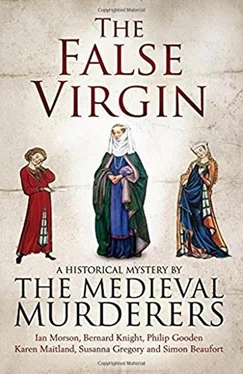Yet, of the two suspects, it was John Hall who seemed much the more likely to have done the deed. As a secret agent in the pay of Thomas Banks, he had easy access to the Savoy. He was also working for Carlos de Flores, or pretending to work for him. At any rate he was being paid by the Castilian. Not paid enough, though. Suppose there had been a prearranged meeting down by the river that night and then a row over money during which Hall stabbed de Flores? The red-capped man was capable of anger. Chaucer remembered his outburst in the Tabard.
De Flores must have had other enemies. Given his womanising reputation at court, there must be any number of husbands and lovers and suitors bearing a grudge against him. With a mixture of amusement and discomfort, Geoffrey considered that he might even be counted among them. After all, he’d seen for himself his wife and the Castilian strolling easily in the Savoy gardens. Had heard her laughter, seen his casual touch on her arm. Bearing a grudge wasn’t the same as sticking the knife in, but one might easily lead to the other.
It was with relief that Geoffrey turned back to some paperwork that had to do with his wine and wool responsibilities. There was something simple and clean about the lists of quantities, about the additions and subtractions and the rates of duties and tax that was far removed from the messy, bloody world of human affairs.
The next morning Chaucer returned to the Savoy Palace, intending to see Thomas Banks and to report on his progress, or lack of it. He had it in mind to question John Hall again. But Geoffrey had no sooner entered the cell-like chamber set aside for him, than there came a tap at the door.
He was surprised when the round-faced priest, Luis, entered and asked to speak to him. Chaucer noticed that he avoided using his name. Otherwise his English was good. Geoffrey motioned Luis towards the only other chair in the room. But the priest shook his head.
‘Not in here, if you please, Master… Here there are too many sharp ears. Please come to our side.’
Curious, Geoffrey followed the black-clad figure along passages and up and down flights of stairs until they arrived at a part of the Savoy that was quite strange to him. It was probably no coincidence that they were at the opposite end of the palace to the area where Katherine Swynford and Philippa Chaucer were lodged. For these were the apartments belonging to Queen Constance and her retinue. Luis led Chaucer into a chamber that was as finely furnished as any he’d seen. There was an abundance of gold and silver plate, and of silk hangings. It was a room that openly proclaimed the pious nature of its occupant. Geoffrey observed the images of the Virgin in recesses and a sculpted relief of the crucifixion set on an altar-like table. Scattered across other surfaces, with casual deliberation, were devotional books bound in gem-encrusted leather. There was an ornamental folding screen in one corner, the wooden handiwork of which, to Geoffrey’s eyes, looked Spanish. In the air hung a faint incense-like smell.
Luis, more at ease now that he was back in his own surroundings, indicated that Chaucer should seat himself in a chair to one side of the fireplace. He sat down opposite. For a moment he dabbed at the gem-studded pectoral cross, uncertain how to begin.
‘You told a story in this house quite lately, a story about a saint whose name I find it difficult to get my teeth around.’
‘Beornwyn,’ said Chaucer, before adding half under his breath, ‘Beornwyn, yet again.’
‘Yes, just so. I too have a story to tell you. It is a short story, Geoffrey – can I call you that? I can get my teeth more easily round Geoffrey. Yes, good. It is a short story about a lady. She is from my homeland of Castile. She marries a man of rank and wealth but, of the two of them, it is she who brings more to the union because her title raises him up higher. They live together under one roof, away from her homeland.’
Chaucer sighed inwardly. Had he been brought to the priest’s chamber to listen to a tedious allegory about Constance and John of Gaunt? Some impatience must have shown on his face because Luis waved a soft, placatory hand.
‘No, no, this is not what you think, Geoffrey. I am not speaking here of the Queen in whose service I toil. I am not speaking at all of your master, Lancaster. I am talking of someone else. This lady, as I say, lives under the same roof as her husband. But her husband has an eye that will not stay still. Is that how you say it in English? An eye that moves all the time?’
‘A wandering eye, you mean? He can’t keep his gaze away from other women.’
‘It is not a question of eyes only. Ever since they have arrived in this foreign land, husband and wife, he has wandered with his eyes and with more besides.’
‘Let me be clear,’ said Geoffrey. ‘We are talking here about Carlos-’
‘Hush,’ said Luis. ‘No names, no names. In the end, the lady can bear it no longer. Perhaps her position is made worse because she is dwelling in a foreign land. Her husband will not moderate his behaviour but he becomes more shameless, more lacking in honour. One night not long ago, she finds him emerging from a chamber where he should not be. In her anger she pursues him until they meet and they are – how do you say it? – face to face. They are by the river. Fearing he is about to do her violence, she seizes a knife, which he carries, and she turns it upon him, like this.’
The priest leaned forward and, with surprising nimbleness, mimed a thrust with a dagger. The jewelled cross swung like a little pendulum.
‘He falls to the earth. At first she tries to stem the flow of blood by tearing a strip from her chemise and applying it to the wound. But it is too late. She runs away. The next day the body is discovered by the river. The lady, she comes to me. She confesses her crime.’
‘She comes to you because you are a priest? Because you are from the same country as her?’
‘Not for either of those reasons. Wait, and you will understand. I know how much the lady has been provoked, but it is still a crime. Geoffrey, believe that I break no secret of the confession. I say again she did not tell this to me as a priest…’
Chaucer felt the ground slipping from beneath his feet. What was the purpose of telling him this confession, relaying it at second-hand? Who was the woman? The wife of Carlos de Flores? He didn’t know de Flores had a wife. But then why should he know? What response was the priest expecting from him?
‘I ask you, Geoffrey, what would happen to the lady under English justice?’
Chaucer hesitated. He did not know. A nobleman had the right to be tried before his peers. But a noble lady? And, anyway, this was a killing of a stranger by a stranger, not by an Englishwoman of an Englishman. Whose business was it to adjudicate?
‘I don’t know,’ he said.
‘Probably better not to bring it to the test?’
‘Probably not.’
‘I am glad you agree, Geoffrey.’
There was a pause. Chaucer detected that incense-like scent in the air again.
The priest continued: ‘I offer a contract, not one that is written down or signed, but a contract all the same. Lately there has been some agitation on this side of the Palace of Savoy about a certain lady who dwells on your side. Indeed, I believe she is a kinswoman of yours by marriage, Geoffrey. Various people on my side have been stirring themselves to cause doubt and confusion on your side – including the gentleman who met his fate down by the river. My idea is this. All doubt and confusion will cease. There will be no more whispers about your lady. In return, the story will be put about that the gentleman died by drowning. We can all agree on that, the English and the Castilians. An unfortunate accident. The dangers of the river. Our troubles will be over. The whispers will stop. We shall live happy and be together.’
Читать дальше












